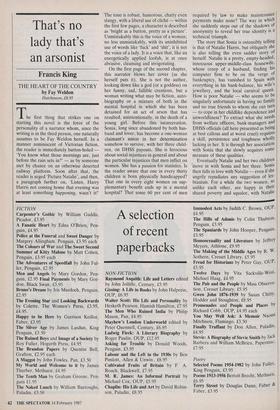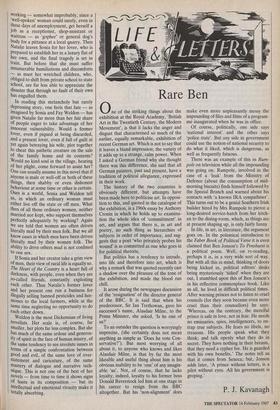That's no lady that's an arsonist
Francis King
THE HEART OF THE COUNTRY by Fay Weldon Hutchinson, £8.95 The first thing that strikes one on starting this novel is the force of the personality of a narrator whom, since the writing is in the third person, one naturally assumes to be Fay Weldon herself. In a manner reminiscent of Victorian fiction, the reader is immediately button-holed 'You know what those mornings are, just before the rain sets in?' - as by someone met by chance on an otherwise deserted railway platform. Soon after that, the reader is urged 'Picture Natalie', and then, a paragraph further on, 'Listen, Harry Harris not coming home that evening was at least something happening, wasn't it!' The tone is robust, humorous, chatty even slangy, with a liberal use of cliché - within the first few pages, a character is described as 'bright as a button, pretty as a picture'. Unmistakably this is the voice of a woman; no less unmistakably, with its uninhibited use of words like 'fuck' and 'shit', it is not the voice of a lady. It is a voice that, like an energetically applied loofah, is at once abrasive, cleansing and invigorating.
On the first page of the second chapter, this narrator blows her cover (as she herself puts it). She is not the author, looking down like a god (or a goddess) on her funny, sad, fallible creations, but a woman writing what may be fiction, auto- biography or a mixture of both in the mental hospital in which she has been detained for an act of arson that has resulted, unintentionally, in the death of a young girl. Before this incarceration, Sonia, long since abandoned by both hus- band and lover, has become a one-woman claimant's union in her determination somehow to survive, with her three child- ren, on DHSS payouts. She is ferocious about social injustices in general and about the particular injustices that men inflict on women. She has a passion for statistics. Is the reader aware that one in every thirty children is born physically handicapped? That one in every eight women on sup- plementary benefit ends up in a mental hospital? That some 60 per cent of men required by law to make maintenance payments make none? The way in which she suddenly steps out of the shadows of anonymity to reveal her true identity is a technical triumph. The story that Sonia is ostensibly telling is that of Natalie Harris, but obliquely she is also telling the even sadder story of herself. Natalie is a pretty, empty-headed, innocuous upper-middle-class housewife, whose creep of a husband, finding his computer firm to be on the verge of bankruptcy, has vanished to Spain with everything in his bank-balance, his wife's jewellery, and the local carnival queen. How is poor Natalie - who seems to be singularly unfortunate in having no family and no true friends to whom she can turn - to cope in her childlike dependence and unworldliness? To extract what she needs from welfare officers, bank-managers and DHSS officials (all here presented as being at best callous and at worst cruel) requires a skill, persistence and toughness wholly lacking in her. It is through her association with Sonia that she slowly acquires some measure of these qualities. . Eventually Natalie and her two children move in with Sonia and her three. Sonia then falls in love with Natalie - even if she angrily repudiates any suggestion of les- bianism. For a while the two women, so unlike each other, are happy in their shared poverty and squalor, with Natalie working — somewhat improbably, since a well-spoken' woman could surely, even in these days of unemployment, get herself a job as a receptionist, shop-assistant or waitress — as 'gopher' or general dog's body for a pittance at a local quarry. Then Natalie leaves Sonia for her lover, who is Prepared to establish her in a luxury flat of her own, and the final tragedy is set in train. But before that she must suffer innumerable humiliations and discomforts — as must her wretched children, who, obliged to shift from private school to state school, are far less able to appreciate the disaster that through no fault of their own has engulfed them.
In reading this melancholy but rarely depressing story, one feels that fate — as imagined by Sonia and Fay Weldon — has given Natalie far more than her fair share of people eager to take advantage of her innocent vulnerability. Would a former lover, even if piqued at being discarded, and a present lover, even if full of guilt at yet again betraying his wife, plot together to cheat this pathetic creature on the sale of the family home and its contents? Would no kind soul in the village, hearing of her plight, come forward to assist her? One can usually assume in this novel that if anyone is male or well-off or both of these things, then shabby or even dishonest behaviour at some time or other is certain. Ours is a world, Sonia and Weldon tell us, in which an ordinary woman must either live off the state or off men. What then of all those ordinary women, neither married nor kept, who support themselves Perfectly adequately by working? Again we are told that women are often driven literally mad by their men folk. But we all know cases in which men have been driven literally mad by their women folk. The ability to drive others mad is not confined to one sex.
If Sonia and her creator take a grim view of men, their view of rural life is equally so. The Heart of the Country is a heart full of darkness, with people, even when they are so-called friends, constantly exploiting each other. Thus Natalie's former lover and her present one run a business for illegally selling banned pesticides and hor- mones to the local farmers, while at the same time neglecting no opportunity to do each other down.
Weldon is the most Dickensian of living novelists. Her scale is, of course, far smaller, her plots far less complex. But she has much of the same ardour and generos- ity of spirit in the face of human misery, of the same tendency to see involute issues in terms of a simple confrontation between good and evil, of the same love of over- statement and caricature, of the same mastery of dialogue and narrative tech- nique. This is not one of the best of her novels — from time to time it shows signs of haste in its composition — but its intellectual and emotional vivacity make it totally absorbing.



























































 Previous page
Previous page